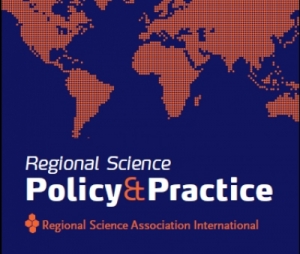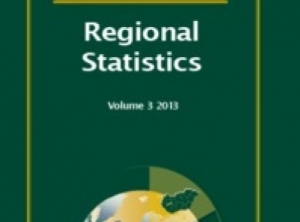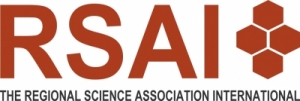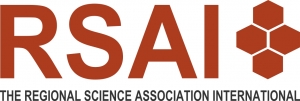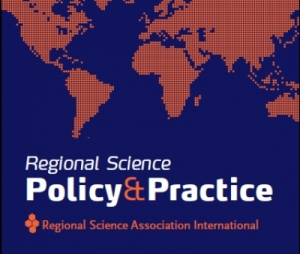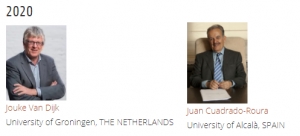RSAI Worldwide
Elisabete Martins
Friday, October 09 - REAL/PUCRS Fall Seminar

REAL focuses on the development and application of systemic economic models at the urban and regional levels. Since 2015, REAL has hosted more than 110 graduate students and visiting scholars from China, Brazil, Colombia, USA, Chile, and Spain among other countries.
Sofía Jiménez. Professor, University of Zaragoza, Spain.
| This email address is being protected from spambots. You need JavaScript enabled to view it. |

Natália Branco Stein. PhD Student, Graduate Program in Development Economics, Pontifical Catholic University of Rio Grande do Sul, Brazil.
| This email address is being protected from spambots. You need JavaScript enabled to view it. |

October
09
09:00 -10:00 am
Central Time (US)
Join Zoom Meeting by clicking here
Meeting ID: 997 1523 2314
Passcode: 923169
Sofía Jimézes
Professor, University of Zaragoza, Spain
"Challenging climate change: economic effects of regions interaction from an “atmosfear” perspective"
In recent years, the effects of climate change have become a topic of growing interest in the literature. Despite that, a more focused study on its spatial economic and structural characteristics is necessary, to shed light on the responsibilities of the different countries about the climate change. This paper analyses the spatial economic causes for the global areas in the world during a period of 15 years. Based on an environmentally extended interregional input-output model, we estimate the carbon dioxide emissions embodied in international trade. In the second part, and taking into account the previous analysis, we measure the spatial effects of the different countries among them, carrying out a spatial econometric analysis to find the most suitable spatial model for our analysis. Besides, as a contrast with traditional contiguity and distances weigh matrices, in this paper we create a weight matrix based on the atmospheric movements of wind. The results offer a different and new approach on this field, highlighting the importance of the spillovers of the closest neighbors to explain the CO 2 emissions of the local country.
Natália Branco Stein
PhD Student, Pontifical Catholic University of Rio Grande do Sul, Brazil.
"The valuation of creativity and the index of Brazilian creative cities: what is their relationship with economic development?"
This thesis project focuses on themes related to economic and creativity debate and proposes addresses the relationship between creativity and the universe of urban and regional economy from three essays. The first one presents as the main objective understanding the origin of creativity valorization, bringing the concepts that are linked with it, identifying how creativity interacts with urban and regional economy. The second essay presents the concept of creative cities, identifying the main initiatives to develop creative cities in the world, to thereby build a Brazilian creative city index. Finally, the last essay, intends to analyse the relation between the presence of talent, tolerance and technology in the creative cities and the level of economic development.
RSPP Call for Papers | Special Issue on Design, Implementation and Evaluation of Territorial Inequalities Policies
Special Issue Theme:
“Design, Implementation and Evaluation of Territorial Inequalities Policies”
RSPP-EUREAL initiative coordinated by Ana Vinuela This email address is being protected from spambots. You need JavaScript enabled to view it.
The objective of the RSPP Special Issue is to publish scientific work on the design, implementation and evaluation on integrative policy mechanisms to enable supranational, national and regional government agencies to address territorial inequalities and to imagine future spaces in which the allocation of resources is consistent with principles of social and spatial justice.
Topics are:
- The measurement and understanding of spatial (in)justice and territorial inequalities at national, regional or local level.
- The impact of the economic crisis, the austerity policies or the Covid-19 on territorial inequalities, especially in relation to the different models of territorial governance, sustainable economic development and public service delivery.
- Perceptions of spatial (in)justice vs quantifiable territorial inequalities
- Framing and justification of territorial autonomy movements and their levels of support in relation to the real or perceived spatial (in)justice.
- Efficacy and appropriateness of current territorial policies and instruments for addressing the challenges of territorial inequalities and spatial justice.
The RSPP Special Issue will combine qualitative and quantitative research papers and methods at multiple scales of enquiry.
Important Dates:
|
Webinar with draft papers |
January 29, 2021 |
|
Papers Submission |
March 19, 2021 |
|
Expected Publication |
Autumn, 2021 |
|
Expected Compilation |
December, 2021 |
The New Issue of Regional Statistics is already Available! (2020, VOL 10, No 2.)
We are pleased to inform you that a new issue of the Regional Statistics has been released and now it’s avaiable online.
http://www.ksh.hu/docs/hun/xftp/terstat/2020/eterstat2002.pdf
REGIONAL STATISTICS, 2020, VOL 10, No 2.
STUDIES
Natalia Zdanowska – Céline Rozenblat – Denise Pumain: Evolution of urban hierarchies under globalisation in Western and Eastern Europe
http://www.ksh.hu/docs/hun/xftp/terstat/2020/rs100202.pdf
Luca Salvati: Density-dependent population growth in Southern Europe (1961–2011): A non-parametric approach using smoothing splines
http://www.ksh.hu/docs/hun/xftp/terstat/2020/rs100201.pdf
Zoltán Bánhidi– Imre Dobos – András Nemeslaki: What the overall Digital Economy and Society Index reveals: A statistical analysis of the DESI EU28 dimensions
http://www.ksh.hu/docs/hun/xftp/terstat/2020/rs100209.pdf
Ngo Thai Hung: Volatility spillovers and time-frequency correlations between Chinese and African stock markets
http://www.ksh.hu/docs/hun/xftp/terstat/2020/rs100203.pdf
Fernando Antonio Ignacio González: Regional price dynamics in Argentina (2016–2019)
http://www.ksh.hu/docs/hun/xftp/terstat/2020/rs100205.pdf
Haryo Kuncoro: Regional inflation dynamics and its persistence – The case of selected regions in Indonesia
http://www.ksh.hu/docs/hun/xftp/terstat/2020/rs100211.pdf
Dimitrios Tsiotas– Umut Erdem – K. Mert Cubukcu: Outlining the historical framework of the aviation sector in Turkey: A spatiotemporal approach
http://www.ksh.hu/docs/hun/xftp/terstat/2020/rs100204.pdf
Csilla Nezdei: The prospects of regional market place developments in economic geographical perspective Case study of Balaton Resort Area, Hungary
http://www.ksh.hu/docs/hun/xftp/terstat/2020/rs100206.pdf
Mihály Lados–Éva Szabina Somossy–Tamás Tóth: Regional Statistics, Vol. 10. No. 2. 2020: 166–185; DOI: 10.15196/RS100207 Financial subsidies and the location decision of solar power plants in Hungary: An empirical investigation
http://www.ksh.hu/docs/hun/xftp/terstat/2020/rs100207.pdf
Zsombor Szabó– Tibor Sipos: Separation effects in a microregion: traffic volume estimation between the settlements of Lake Velence
http://www.ksh.hu/docs/hun/xftp/terstat/2020/rs100208.pdf
Balázs Benjámin Budai – István Tózsa: Regional inequalities in front-office services Focus shift in e-government front offices and their regional projections in Hungary
http://www.ksh.hu/docs/hun/xftp/terstat/2020/rs100212.pdf
VISUALIZATIONS
Áron Kincses–Géza Tóth: How coronavirus spread in Europe over time: national probabilities based on migration networks
http://www.ksh.hu/docs/hun/xftp/terstat/2020/rs100210.pdf
Join us to our social networking sites:
APDR Congress 2020 | All main sessions are available online on APDR Youtube chanal
All main sessions from APDR congress were live online and recorded and are now available at the APDR Youtube chanal (https://www.youtube.com/channel/UCsWNSFYf8oLb4Bc07csWmNQ/videos?view_as=subscriber) or congress page (http://www.apdr.pt/congresso/2020/program.html).
The latest issue of Papers in Regional Science is available! Volume 99, 5 (October 2020)
|
Papers in Regional Science Pages: 1163-1511 October 2020 |
ISSUE INFORMATION
![]() Free Access
Free Access
Pages: 1163-1164 | First Published: 17 September 2020
FULL ARTICLES
![]() Open Access
Open Access
Kolja Hesse, Dirk Fornahl
Pages: 1165-1183 | First Published: 10 March 2020
Waad K. Ali, K. Bruce Newbold
Pages: 1185-1213 | First Published: 18 March 2020
![]() Open Access
Open Access
Robert Tijssen, Wouter van de Klippe, Alfredo Yegros
Pages: 1215-1236 | First Published: 21 March 2020
![]() Open Access
Open Access
Firm‐specific cluster effects: A meta‐analysis
Nils Grashof
Pages: 1237-1260 | First Published: 09 March 2020
The effects of highways on school segregation
Philip Heidt, M. Taha Kasim
Pages: 1261-1280 | First Published: 16 April 2020
Paul A. Lewin, Bruce A. Weber
Pages: 1281-1300 | First Published: 10 March 2020
Land use regulations and the dispersion of the IT Industry in the San Francisco Bay area
Taner Osman
Pages: 1301-1316 | First Published: 04 April 2020
An analysis of pedestrian crashes using a spatial count data model
Rebekka E. Apardian, Oleg Smirnov
Pages: 1317-1338 | First Published: 29 February 2020
Ida Lovén, Cecilia Hammarlund, Martin Nordin
Pages: 1339-1365 | First Published: 21 March 2020
![]() Open Access
Open Access
Attila Varga, Norbert Szabó, Tamás Sebestyén
Pages: 1367-1388 | First Published: 19 March 2020
Sandra M. Sánchez‐Cañizares, L. Javier Cabeza‐Ramírez, M. Dolores Guerrero‐Baena
Pages: 1389-1411 | First Published: 04 April 2020
![]() Open Access
Open Access
Optimizing entrepreneurial development processes for smart specialization in the European Union
László Szerb, Raquel Ortega‐Argilés, Zoltan J. Acs, Éva Komlósi
Pages: 1413-1457 | First Published: 16 April 2020
Firm financial soundness and knowledge externalities: A comparative regional analysis
Lara Abdel Fattah, Giuseppe Arcuri, Aziza Garsaa, Nadine Levratto
Pages: 1459-1486 | First Published: 25 April 2020
Luis Diaz‐Serrano, William Nilsson
Pages: 1487-1508 | First Published: 18 May 2020
BOOK REVIEW
Amitrajeet A. Batabyal
Pages: 1509-1511 | First Published: 15 June 2020
Election of RSAI new Councillors at large
Dear RSAI members,
By RSAI Constitution, nominations for Councilors-at-large “shall be made by the Council after solicitation of suggestions from the members of the Association”. At the end of 2020, the positions on the RSAI Council held by Prof. Amit Batabyal (Rochester Institute of Technology), Prof. Sumana Bandyopadhyay (Kolkata University), and Prof. Rosella Nicolini (Universitat Autònoma de Barcelona) will expire; we therefore inform that the proposals for three councilors-at-large can be sent to the address This email address is being protected from spambots. You need JavaScript enabled to view it. within October 10, 2020. Candidatures will have to include a professional CV and a photo.
The election of three councilors-at-large for the period 2021-2023 will take place electronically by RSAI members during the second half of October 2020.
Best regards,
Andrea Caragliu
RSAI Executive Director
Call for RSAI Programs 2021 (DEADLINE October 10, 2020)
Nurturing new talent 2021
The RSAI aims to continue promoting the development of Regional Science by nurturing new talent in 2021. The council has therefore pledged resources to co-finance workshops and summer institutes intended to provide substantive training to pre-doctoral researchers, including the presentation of their work and receiving feedback from senior scholars and their peers. It is expected that the selected workshops and institutes will have considerable international geographical coverage.
Organizers of workshops and summer schools fulfilling the above aims are encouraged to submit a two-page case for support, using the included template, within October 10, 2020 to the RSAI secretariat (This email address is being protected from spambots. You need JavaScript enabled to view it.). Individuals are encouraged to consult with their national and supranational sections to allow better coordination among different initiatives.
All applications will be reviewed by the Committee and will have to be formally approved by the RSAI Council. Their decision will be final.
Building bridges in regional science
2021 conference participation support
The RSAI facilitates the participation of researchers from low-income and lower-middle-income economies (as defined by the World Bank: https://data.worldbank.org/about/country-and-lending-groups#Low_income) at the five largest Regional Science Conferences in 2021: LARSA, PRSCO, ERSA, NARSC, and the World Congress.
RSAI will provide a subsidy up to USD 500 (or the equivalent in other currencies) to selected researchers. This is likely to cover the conference registration fee and some local travel costs. Alternative means of financing will have to be sought for international travel and accommodation.
Only one author of a submitted paper presentation proposal can apply for a subsidy.
Interested researchers should upload a two-page CV plus a one-page motivation –including a budget with proposed sources of funding of the conference-related registration, travel and accommodation costs – within 30 days of receiving confirmation of the acceptance of the researcher’s abstract by the conference organizers.
Applicants should have had a paper accepted for presentation at the conference.
All applications, to be submitted at the following link:
https://www.emailmeform.com/builder/form/4Qb1O9ro1K0LuWIeG
will be reviewed by the Committee and will have to be formally approved by the RSAI Council. Their decision will be final.
APDR2020 | Plenary Session, Thursday, 10 September 2020, live online with Andrés Rodríguez-Pose, Peter NIjkamp and Eduardo Haddad
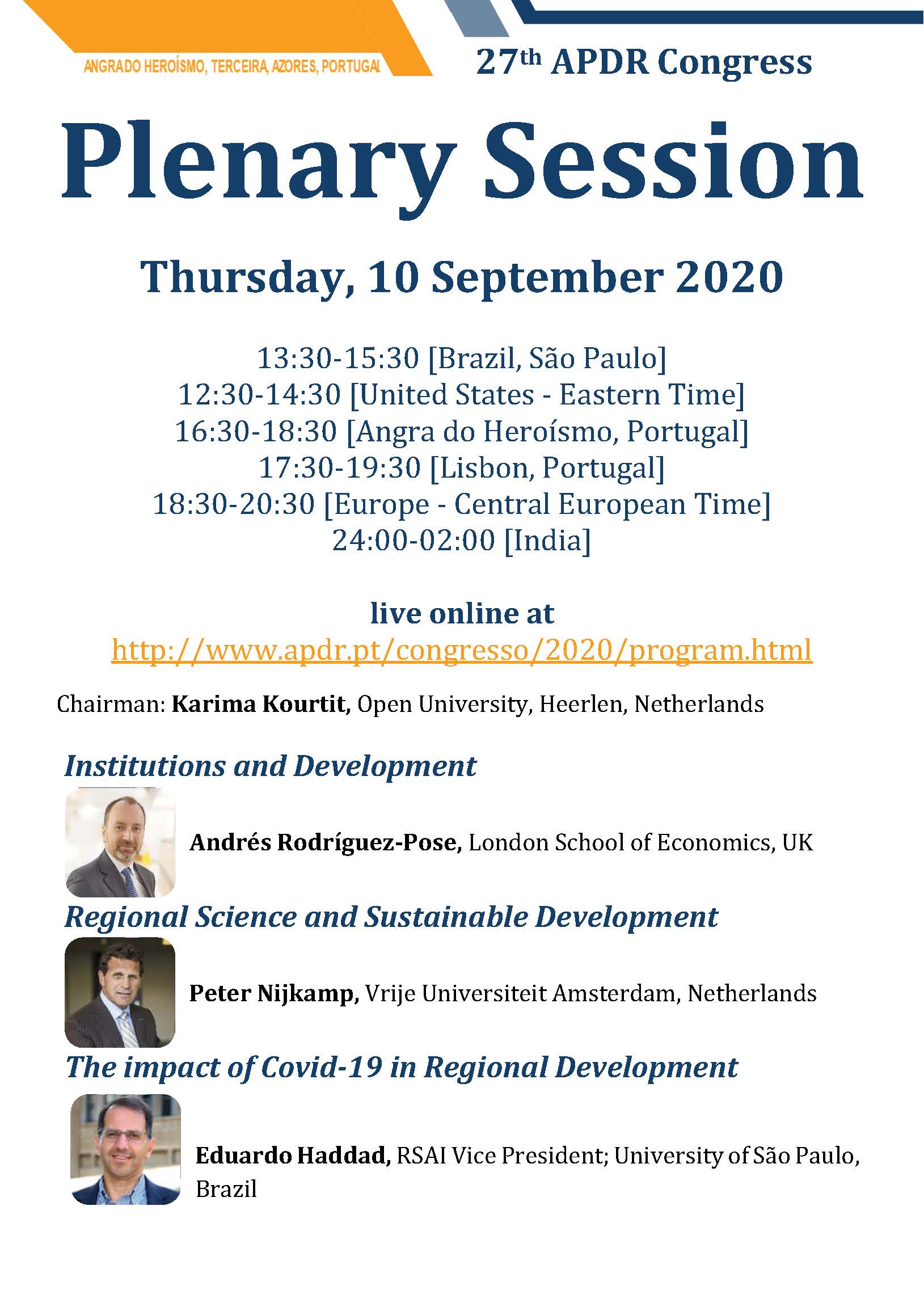 Plenary Session
Plenary Session
Thursday, 10 September 2020
13:30-15:30 [Brazil, São Paulo]
12:30-14:30 [United States - Eastern Time]
16:30-18:30 [Angra do Heroísmo, Portugal]
17:30-19:30 [Lisbon, Portugal]
18:30-20:30 [Europe - Central European Time]
24:00-02:00 [India]
live online at
RSPP Call for Papers | Special Issue on Policy Challenges and Economic Sustainability during Sudden Pandemic Outbreak
Regional Science Policy and Practice
Call for papers
Special Issue Theme: “Policy Challenges and Economic Sustainability during Sudden Pandemic Outbreak”
In the present scenario, a sudden outburst of pandemic diseases can create a profound and serious impact on the global economy, driving policymakers towards finding new and innovative ways to retain economic stability. These diseases when left uncontrolled can initiate a persistent and major-public health problem all over the world with severe consequences. Even with well-determined precaution measures and unremitting lockdown, this sort of epidemic disease often results in a global uncertainty with a huge pressure of the economic crisis. The impacts of this outbreak include economic loss in various forms, which ranges from mortality to the diverse effects on productivity. Here, the most miserable part is that economic loss due to production efficiency and economic returns are considerably greater than the mortality. On the other side, health hazards relating to this epidemic accompanied by fear and panic, further results in numerous economic risks with a complete blockage of global enterprise and supply chain management facilities.
Economic risks due to pandemics are nontrivial and require careful policy planning and control measures. The consequences of the outbreak are highly indeterminate and have various effects on the economy. Certain sectors such as pharmaceutical industries can financially benefit more, while the other sectors may suffer inexplicably. It is inevitable that vulnerable populations especially the poor people become the victim as they have insufficient access to healthcare facilities with reduced income. Several factors such as trade disproportion, exchange rate movement, variation in market interest, and many more confound the process of policy management during a pandemic outbreak. However, the relationship between pandemic diseases and policy uncertainty can be indirect, but it is real. Most of the complex policy uncertainties can be easily tackled, if there is a cooperative response from a range of departments and government organizations. Hence, developing sustainable policies to deal with improved sanitation, provision of clean water facilities, better urban planning, and infrastructures can lead to an ideal solution as they decrease the rate of recurrence of human contact with pathogenic organisms. Eventually, establishing appropriate policies to build stronger health systems and supporting proper nutrition can empower human health with lesser prone to infectious diseases. However, construction of such policies and maintaining economic stability possess a greater amount of risk that impedes the growth of the country. In this context, this special issue intends to bring out various policy challenges and its appropriate solutions to effectively maintain economic stability during the pandemic situation.
Tentative Topics:
- Effective policy planning and outbreak readiness
- Pandemics: risk, impacts, and mitigation over the society and its preventive measures
- Tackling economic crisis during pandemic situations and policy planning
- Policy challenges during pandemic situations and regulatory mechanisms
- Sustainable policy planning with diversely affected economic sectors
- Impact of demographic trends towards policy planning during pandemic situations
- Effective policy planning measures to meet current needs and resources with future requirements
- Policy evaluation frameworks and tools for sustainable policy development during pandemic situations
- Decision making architectures and design methodologies for long-term policy planning and implementation
- Combined effect of economic crisis and infectious disease control measures on economic sustainability
- Disruptions due to pandemic diseases and their financial consequences
Important Date: Webinar with draft papers April 14, 2021
Guest Editorial Team:
|
Lead Guest Editor
|
Name: Dr. Carlos Enrique Montenegro Marin
Affiliation: Professor,
District University Francisco José de Caldas,
Bogotá, Colombia
Official Email ID: This email address is being protected from spambots. You need JavaScript enabled to view it.
Google Scholar: https://scholar.google.com/citations?user=ejJHY40AAAAJ&hl=es
Research Gate: https://www.researchgate.net/profile/Carlos_Marin4
|
Dr. Carlos Enrique Montenegro Marin received the Diploma of Advanced Studies degree from the Pontifical University of Salamanca, in 2008, the M.Sc. degree in Information and Communication Systems from the Universidad Distrital Francisco José de Caldas, and the Ph.D. degree in Systems and Computer Services for the Internet from the University of Oviedo, Asturias, Spain, in 2012. He was classified with the highest recognition of research by Colciencias in 2017 (Senior Researcher). He is the director of the GIIRA research group of the University District, a group that also received the highest recognition by Colciencias. He is currently a Systems Engineer. His skills and expertise are in the areas of Java Programming, Cloud Computing, Web Development, Object-Oriented Programming, Grid Computing, LMS, Virtualization, Software Engineering, and Linux Administration.
|
Co-Guest Editors
|
Name: Dr. Paulo Alonso Gaona Garcia
Affiliation: Professor,
District University Francisco José de Caldas,
Bogotá, Colombia
Official Email ID: This email address is being protected from spambots. You need JavaScript enabled to view it.
Google Scholar: https://scholar.google.es/citations?user=xMe8_CMAAAAJ&hl=es
Research Gate: https://scholar.google.es/citations?user=xMe8_CMAAAAJ&hl=es
|
Dr. Paulo Alonso Gaona Garcia received his Ph.D in Information and Knowledge Engineering in Computer Science from University of Alcalá in 2014 and Masters in Information and Information Sciences Communications, Teleinformatics from Francisco José de Caldas District University in 2007. He was working as Professor and Project Advisor in National Pedagogical University. He is currently working as Director of Engineering Research in Francisco José de Caldas District University. His research and publication topics are in the areas of Internet of Things, ad hoc Networks, Error Statistics, Power Consumption, Quality of Service, Telecommunication Power Management, and Wireless Sensor Networks.
|
Co-Guest Editors
|
Name: Dr. Edward Rolando Nuñez Valdez
Affiliation: Professor,
University of Oviedo,
Oviedo, Spain
Official Email ID: This email address is being protected from spambots. You need JavaScript enabled to view it.
Google Scholar: https://scholar.google.es/citations?hl=es&user=pNT4A7wAAAAJ
Research Gate: https://www.researchgate.net/profile/Edward_Nunez_Valdez
|
Dr. Edward Rolando Nuñez Valdez is working as a Professor at the University of Oviedo in Spain. He completed his Ph.D. from the University of Oviedo in Computer Engineering, Master Degree in Software Engineering from the Pontifical University of Salamanca and B.S. in Computer Science from Autonomous University of Santo Domingo. He has participated in several research projects; He has taught computer science at various schools and universities and has worked in software development companies and IT consulting for many years. He has published several articles in international journals and conferences. His research interests include Web Engineering, Artificial Intelligence, Cloud Computing, Recommendation Systems, Modeling Software with DSL and MDE.
2020 elected RSAI Fellows
2020 elected RSAI Fellows
RSAI is pleased to announce the election of the following Fellows in 2020 - congratulations!
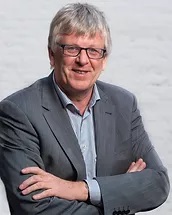 University of Groningen, THE NETHERLANDS
|
 University of Alcalà, SPAIN
|
About Us
The Regional Science Association International (RSAI), founded in 1954, is an international community of scholars interested in the regional impacts of national or global processes of economic and social change.


